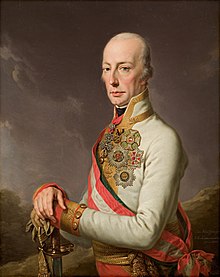
Back Frans II Afrikaans Franz II. (HRR) ALS فرانتس الثاني (إمبراطور روماني مقدس) Arabic فرانتس التانى (امبراطور رومانى مقدس) ARZ Francisco I d'Austria y II del Sacru Imperiu Romanu Xermánicu AST II Frans Azerbaijani ایکینجی فرانتس (ایمپیراتور) AZB Франц II Bashkir Франц II Byelorussian Франц II (імпэратар Сьвятой Рымскай імпэрыі) BE-X-OLD
Francis II and I (German: Franz II.; 12 February 1768 – 2 March 1835) was the last Holy Roman Emperor as Francis II from 1792 to 1806, and the first Emperor of Austria as Francis I from 1804 to 1835. He was also King of Hungary, Croatia and Bohemia, and served as the first president of the German Confederation following its establishment in 1815.
The eldest son of future Emperor Leopold II and Maria Luisa of Spain, Francis was born in Florence, where his father ruled as Grand Duke of Tuscany. Leopold became Holy Roman Emperor in 1790 but died two years later, and Francis succeeded him. His empire immediately became embroiled in the French Revolutionary Wars, the first of which ended in Austrian defeat and the loss of the left bank of the Rhine to France. After another French victory in the War of the Second Coalition, Napoleon crowned himself Emperor of the French. In response, Francis assumed the title of Emperor of Austria. He continued his leading role as Napoleon's adversary in the Napoleonic Wars, and suffered successive defeats that greatly weakened Austria as a European power. In 1806, after Napoleon created the Confederation of the Rhine, Francis abdicated as Holy Roman Emperor, which in effect marked the dissolution of the Holy Roman Empire. Following the defeat of the Fifth Coalition, Francis ceded more territory to France and was forced to wed his daughter Marie Louise to Napoleon.
In 1813, Francis turned against Napoleon and finally defeated him in the War of the Sixth Coalition, forcing the French emperor to abdicate. Austria took part as a leading member of the Holy Alliance at the Congress of Vienna, which was largely dominated by Francis' chancellor Klemens von Metternich, culminating in a new European order and the restoration of most of Francis' ancient dominions. Due to the establishment of the Concert of Europe, which resisted popular nationalist and liberal tendencies, Francis was viewed as a reactionary later in his reign. Francis died in 1835 at the age of 67 and was succeeded by his son, Ferdinand I.
© MMXXIII Rich X Search. We shall prevail. All rights reserved. Rich X Search

